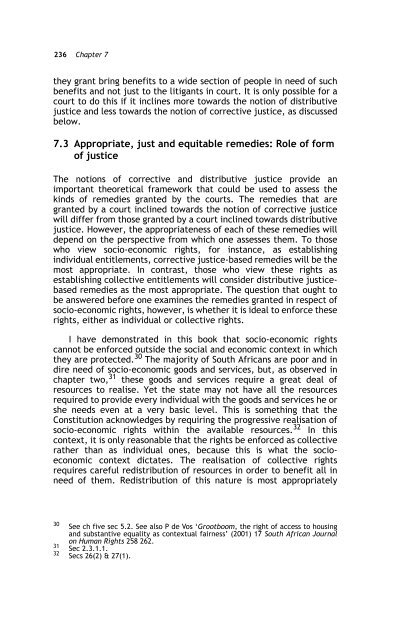LITIGATING SOCIO-ECONOMIC RIGHTS IN SOUTH AFRICA - PULP
LITIGATING SOCIO-ECONOMIC RIGHTS IN SOUTH AFRICA - PULP
LITIGATING SOCIO-ECONOMIC RIGHTS IN SOUTH AFRICA - PULP
Create successful ePaper yourself
Turn your PDF publications into a flip-book with our unique Google optimized e-Paper software.
236 Chapter 7<br />
they grant bring benefits to a wide section of people in need of such<br />
benefits and not just to the litigants in court. It is only possible for a<br />
court to do this if it inclines more towards the notion of distributive<br />
justice and less towards the notion of corrective justice, as discussed<br />
below.<br />
7.3 Appropriate, just and equitable remedies: Role of form<br />
of justice<br />
The notions of corrective and distributive justice provide an<br />
important theoretical framework that could be used to assess the<br />
kinds of remedies granted by the courts. The remedies that are<br />
granted by a court inclined towards the notion of corrective justice<br />
will differ from those granted by a court inclined towards distributive<br />
justice. However, the appropriateness of each of these remedies will<br />
depend on the perspective from which one assesses them. To those<br />
who view socio-economic rights, for instance, as establishing<br />
individual entitlements, corrective justice-based remedies will be the<br />
most appropriate. In contrast, those who view these rights as<br />
establishing collective entitlements will consider distributive justicebased<br />
remedies as the most appropriate. The question that ought to<br />
be answered before one examines the remedies granted in respect of<br />
socio-economic rights, however, is whether it is ideal to enforce these<br />
rights, either as individual or collective rights.<br />
I have demonstrated in this book that socio-economic rights<br />
cannot be enforced outside the social and economic context in which<br />
they are protected. 30 The majority of South Africans are poor and in<br />
dire need of socio-economic goods and services, but, as observed in<br />
chapter two, 31 these goods and services require a great deal of<br />
resources to realise. Yet the state may not have all the resources<br />
required to provide every individual with the goods and services he or<br />
she needs even at a very basic level. This is something that the<br />
Constitution acknowledges by requiring the progressive realisation of<br />
socio-economic rights within the available resources. 32 In this<br />
context, it is only reasonable that the rights be enforced as collective<br />
rather than as individual ones, because this is what the socioeconomic<br />
context dictates. The realisation of collective rights<br />
requires careful redistribution of resources in order to benefit all in<br />
need of them. Redistribution of this nature is most appropriately<br />
30<br />
See ch five sec 5.2. See also P de Vos ‘Grootboom, the right of access to housing<br />
and substantive equality as contextual fairness’ (2001) 17 South African Journal<br />
on Human Rights 258 262.<br />
31<br />
Sec 2.3.1.1.<br />
32 Secs 26(2) & 27(1).
















